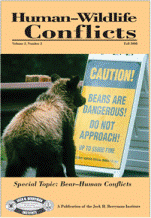Center, Internet, Wildlife Damage Management

Human–Wildlife Interactions
Date of this Version
2007
Document Type
Article
Abstract
This paper explores the role of public opinion in a landmark shift in the federal predator control program. In 1963, the Leopold Committee recommended extensive reform in the federal predator control program, predicting that growing public support for the environmental movement would force such a move if the government did not initiate a change. In the years following the publication of the Leopold Report, the U.S. Division of Wildlife Services reformed its predator control program and tried to improve its public image. Meanwhile, both environmentalists and ranchers fought to control public opinion about the issue. The 1972 ban on predacides (poisons for predators) in federal predator control programs resulted as much from the environmentalists’ ability to control public opinion as from the changing scientific understanding of predators.


Comments
Published in Human-Wildlife Conflicts Volume 1, Number 1, Pages 112–124, Spring 2007. Published and copyright by the Jack H. Berryman Institute. http://www.berrymaninstitute.org/journal/index.html